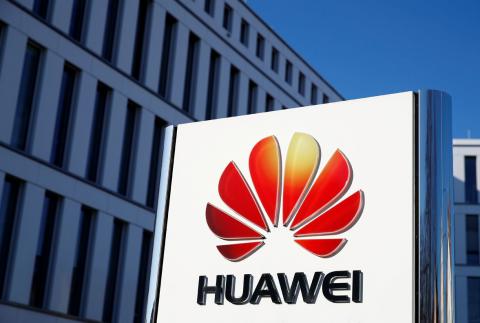Advertisement
Britain to allow Huawei restricted access to 5G network
LONDON (Reuters) - Britain will allow Huawei Technologies a restricted role in building parts of its 5G network, seeking a middle way in a bitter dispute between the United States and China over the next generation of communications technology.
Huawei, the world's biggest producer of telecoms equipment, is under intense scrutiny after the United States told allies not to use its technology because of fears it could be a vehicle for Chinese spying. Huawei has categorically denied this.
The Daily Telegraph newspaper reported Britain's National Security Council, chaired by Prime Minister Theresa May, had agreed to allow Huawei access to non-core parts of 5G mobile infrastructure like antennas, despite concerns from ministers.
A security source told Reuters that Britain would block Huawei from all core parts of the 5G network and access to non-core parts would be restricted. A second source confirmed that. Both spoke on condition of anonymity.
European nations are treading a fine line in the dispute between the world's two most powerful countries, under pressure from the United States to take a hard line on Huawei but also anxious not to sour trading and diplomatic relations with China.
Britain's compromise could provide a template for others to follow that the world's leading intelligence-sharing network - the anglophone Five Eyes alliance - could live with. Huawei also welcomed London's move.
However, some British lawmakers remained opposed.
"Allowing Huawei into the UK's 5G infrastructure would cause allies to doubt our ability to keep data secure and erode the trust essential to Five Eyes cooperation," said Tom Tugendhat, the chairman of Britain's Foreign Affairs Committee.
"The definition of core and non-core is a very difficult one with 5G," he added.
Britain has conducted an "evidence-based review" of the 5G supply chain to ensure a secure base "now and in the future", a government spokesman said on Wednesday.
In what some have compared to the Cold War arms race, the United States is worried 5G dominance would give any global competitor such as China an advantage Washington is not ready to accept.
COMPROMISE
5G, which will offer much faster data speeds and become the foundation stone of many industries and networks, is seen as one of the biggest innovations since the birth of the internet itself a generation ago.
"There have been different approaches across the Five Eyes and across the allied wider Western alliance towards Huawei and towards other issues as well," said Ciaran Martin, head of the cyber center of Britain's main eavesdropping agency, GCHQ.
Martin, head of the National Cyber Security Centre (NCSC), said Britain's decision would be announced in due course.
Huawei's equipment is either not present or is being stripped out of existing core networks in Britain, but is widely used in existing lower risk parts such as radio masts.
Operators such as Vodafone have warned a complete ban would significantly extend the cost and time to deploy 5G.
What Britain is trying to do is keep Huawei's technology away from the brain of the network, while using it in the less sensitive parts of the nervous system.
The telecoms equipment market is divided between three majors suppliers - Huawei, Sweden's Ericsson and Finland's Nokia - and network operators oppose any reduction that would limit competition among them.
Britain is an important market for Huawei, and the Chinese company welcomed the decision.
"We welcome reports that the UK government is moving towards allowing Huawei to help build the UK's 5G networks," a Huawei spokesman said.
"While we await a formal government announcement, we will continue work cooperatively with the government and the industry and their evidence-based approach to network security."
(Additional reporting by Liz Piper, and Jack Stubbs, and Michael Holden in Glasgow; Editing by Guy Faulconbridge, Kate Holton and Mark Potter)



















Add new comment